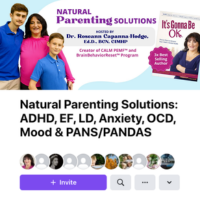When you have a bright kid who is so articulate but struggles with remembering everyday tasks, doing their homework and walking around daydreaming without a care in the world, boy it can be frustrating for parents. It is so hard to understand why someone so clearly intellectual can’t manage to keep their room clean, have a sense of time or ever remember a project (like ever!).
You feel more like a jail warden and less like a parent. I get it and so do a lot of other parents who are in the same boat as you.
What Does Executive Functioning Mean?
So you may have heard of executive functioning and you know that your kid is lacking in attention and executive functioning skills but really don’t even know what it means for your kid in the real world.
Executive functioning is a set of brain skills that help us organize our thinking and actions for a future action or goal. We use these mental skills everyday and they involve organization, memory, shifting gears, cognitive, behavioral and emotional flexibility, and self-control and self-awareness.
When children and teens (and adults too) lack executive functioning, it can be hard to shift their attention, follow multi-step directions, start and complete tasks, and plan for future tasks because they don’t have a good on-site “job manager” that organizes and plans.
Executive functions are central processes that are most intimately involved in giving organization and order to our actions and behavior. In other words, it's that all important ability to see a future result and then know those steps to get there.
What Does Executive Functioning Deficit Look Like in The Real World?
For an individual lacking executive functioning skills, they just don’t see the end result and therefore they have NO IDEA of what they have to do. It doesn’t matter how smart your kid is, if they don’t have good executive functioning, they just don’t think about future outcomes.
I hope you are having a big ah ha moment! That is why your kid can’t ever seem to independently get stuff done in non-preferred areas because they just don’t see in their mind’s eye the outcome.
Imagine someone asking you to cook a meal for 100 people but you don’t know what event it is for or for whom. Exactly! How would you know what to make?! Well, that is what we do everyday when we ask our kids with executive functioning challenges to get that paper done or clean their room. That part of their brain that organizes their thinking and actions for a future goal not only isn’t good, it simply can’t work until we help these kids “see” the end result.
Frontal Lobe and Executive Functioning Deficit
The frontal lobes are an area of the brain that are responsible for higher level thinking, expressive language, processing and those skills are really what defines us as evolved mammals. Our executive functions are part of the frontal lobe regions and are the control center of the brain that allows us to do more complex cognitive functions.
Executive functions involve planning for the future and strategic thinking. Those with executive functioning deficits lack that strategic ability to plan for a future goal or task. That is why our kids with executive functioning deficits need so much support (okay, nudging) from us to get things done.
One’s executive functioning is and can be impacted by age, neuroplasticity, temperament, stress, parenting, learning style, clinical issues such as ADHD, anxiety, depression, OCD, PANS/PANDAS, dyslexia.
What are the 7 Executive Functions of the Brain?
These executive functioning skills guide the ability to see and work toward a future goal.
- Planning and problem solving
- Involves seeing an end result and being able to coordinate thoughts and actions toward successful completion of a goal.
- Self-awareness
- Being aware of different traits of oneself including behavior, thoughts, and feelings and their effect on themselves and others
- Emotional self-regulation
- Being able to take in your environment and control your response to it
- Self-motivation
- The ability to independently begin a task or activity and to generate ideas, responses, or problem-solving strategies
- Inhibition
- The ability to stop one's own behavior at the appropriate time, including stopping actions and thoughts.
- Non-verbal working memory
- Is a system for temporarily storing and managing the information required to carry out complex physical tasks and visual information
- Verbal working memory
- Working memory: Is a system for temporarily storing and managing the information required to carry out complex cognitive and language-based tasks
How Neurofeedback Can Help Executive Functioning
Like most of the parents of kids with poorly developed executive functioning, you are looking for effective ways to help your child be able to independently think for themselves and of course do better in school. If your child's frontal lobes aren’t to get online, listening, planning, and being independent with their actions are a struggle. You already see how delayed they are in self-management their tasks in compassion to siblings or friends. With our trademarked BrainBehaviorReset™ Method and EF ACTION PLAN™, we calm the nervous system first and then teach kids to see the end result and work backwards so they can take action on their own.
Central to our BrainBehaviorReset™ Method is neurofeedback. Neurofeedback is a safe, natural and effective tool that calms the brain and at the same time it powers up the sluggish processing of one with EF issues, so a child or teen can strategically plan for future action. Until that happens, it isn't possible for the brain to learn new ways of responding. The great news is that neurofeedback can be done at home though our center. The first step is a QEEG brain map or a brain check so we can see why your child can't pay attention and make a successful treatment plan.
Always remember… “Calm Brain, Happy Family™”
Disclaimer: This article is not intended to give health advice and it is recommended to consult with a physician before beginning any new wellness regime.
Always remember… “Calm Brain, Happy Family™”
Are you looking for SOLUTIONS for your struggling child or teen?
Dr. Roseann and her team are all about solutions, so you are in the right place!
There are 3 ways to work with Dr. Roseann:
You can get her books for parents and professionals, including: It’s Gonna Be OK™: Proven Ways to Improve Your Child’s Mental Health, Teletherapy Toolkit™ and Brain Under Attack: A Resource For Parents and Caregivers of Children With PANS, PANDAS, and Autoimmune Encephalopathy.
If you are a business or organization that needs proactive guidance to support employee mental health or an organization looking for a brand representative, check out Dr. Roseann’s media page and professional speaking page to see how we can work together.
Dr. Roseann is a Children’s Mental Health Expert and Therapist who has been featured in/on hundreds of media outlets including, CBS, NBC, FOX News, PIX11 NYC, The New York Times, The Washington Post,, Business Insider, USA Today, CNET, Marth Stewart, and PARENTS. FORBES called her, “A thought leader in children’s mental health.”

She is the founder and director of The Global Institute of Children’s Mental Health and Dr. Roseann Capanna-Hodge. Dr. Roseann is a Board Certified Neurofeedback (BCN) Practitioner, a Board Member of the Northeast Region Biofeedback Society (NRBS), Certified Integrative Medicine Mental Health Provider (CMHIMP) and an Amen Clinic Certified Brain Health Coach. She is also a member of The International Lyme Disease and Associated Disease Society (ILADS), The American Psychological Association (APA), Anxiety and Depression Association of America (ADAA) National Association of School Psychologists (NASP), International OCD Foundation (IOCDF) International Society for Neurofeedback and Research (ISNR) and The Association of Applied Psychophysiology and Biofeedback (AAPB).
© Roseann-Capanna-Hodge, LLC 2023
Disclaimer: This article is not intended to give health advice and it is recommended to consult with a physician before beginning any new wellness regime. *The effectiveness of diagnosis and treatment vary by patient and condition. Dr. Roseann Capanna-Hodge, LLC does not guarantee certain results.













